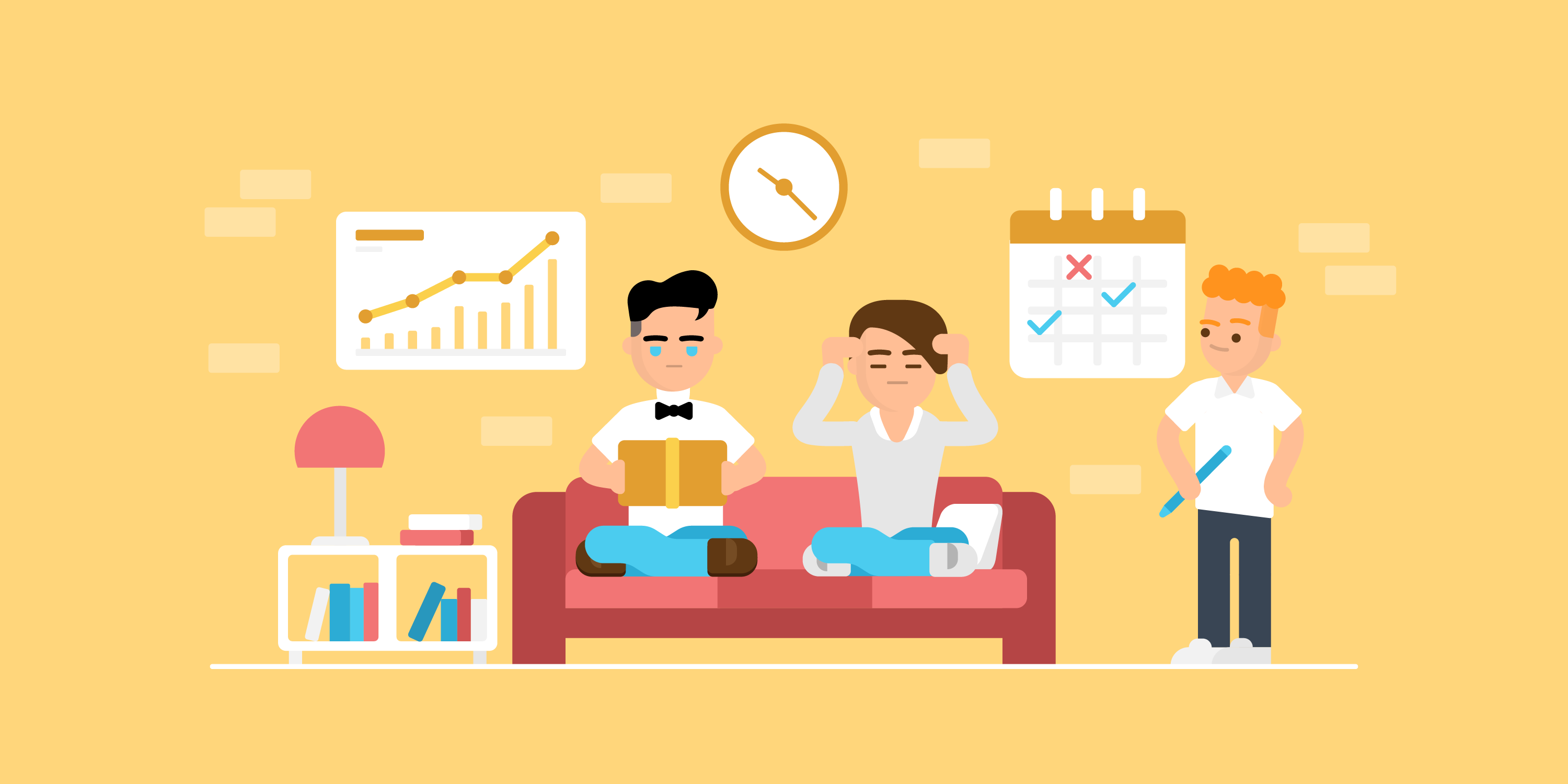Stress in the Workplace | Information, Statistics, and Tips
Updated on 02/24/2026

Work stress? We’ve all been there.
Tight deadlines, endless meetings, and the constant pressure to perform can easily overwhelm you.
But the bigger problem is that stress doesn’t just disappear when the workday ends. It lingers, affecting our productivity, mood, and even our health.
The good news? There are practical ways to manage stress in the workplace.
In this article, we'll explore effective strategies to help you reduce stress and create a healthier, more productive work environment!
Here's what we're going to cover:
- What Is Stress in the Workplace?
- Common Causes of Stress at Work
- Signs and Symptoms of Work-Related Stress
- How Does Stress Affect Productivity and Overall Well-Being
- When Is Stress Too Much?
- 20+ Ways to Relieve Stress
And much more… Let’s dive into it!

Need to make a resume that will land you that stress-free job you’ve had your eye on for ages? Choose one of our templates!
Each one is tried-and-tested and engineered to impress hiring managers regardless of industry.
What Is Stress in the Workplace?
Stress in the workplace is that overwhelming feeling you get when the demands and pressures of your job outweigh your ability to handle them.
According to the World Health Organization (WHO), this happens when the tasks don’t match your knowledge or skills, making you feel stretched too thin.
More and more people are experiencing stress in the workplace. Research conducted by the U.S. Department of Labor shows that 83% of U.S. workers report dealing with work-related stress.
Tight deadlines, long hours, unclear expectations, or a lack of support can be some of the main triggers. When this happens, it’s easy to feel frustrated, anxious or even burned out.
While some pressure at work is natural, ongoing stress can seriously impact your well-being and performance. That’s why understanding workplace stress and how to manage it will help you maintain a healthy, productive work life.
💡
Quick Tip
Are you too stressed at your workplace and thinking about a career change? Check out these career change statistics before you make a final choice!
Common Causes of Stress at Work
Workplace stress is more common than you might think—According to the BHHC Safety Center, 94% of American workers reported feeling stressed at work in 2019.
But why is stress so widespread? The truth is that several factors can turn a regular workday into a stressful one.
Left unmanaged, these causes can build up, making it harder to stay productive and happy at work in the long run.
Here are some of the most common causes of workplace stress:
- High work demand: Heavy workloads, tight deadlines, and unclear responsibilities can easily become overwhelming.
- Lack of control: When you feel like you have no say in how you perform your tasks, it can lead to frustration and stress.
- Insufficient support: A lack of guidance or feedback from managers and colleagues can leave you feeling isolated and unsupported.
- Poor workplace relationships: Conflict with coworkers, bullying, or harassment can create a toxic work environment.
- Unclear roles: Confusion and stress are inevitable if you don’t understand your responsibilities fully.
- Organizational changes: Sudden changes in the workplace and fear of no longer being needed or useful can cause uncertainty and anxiety.
- Workplace discrimination: Experiencing discrimination or unfair treatment can deeply affect both your mental health and job performance.
💡
Quick Tip
Some people may feel more relaxed if they work from the comfort of their home. If you’re one of them, take a look at these 22 top places to find a remote job online!
Signs and Symptoms of Work-Related Stress
Stress can manifest in various ways, and recognizing the signs is crucial for managing it effectively.
By being aware of the signs and symptoms, you can take proactive steps to address stress before it becomes overwhelming.
Whether it affects your behavior, or physical and mental health, knowing how to identify these symptoms is the first step toward regaining balance and maintaining your well-being.
Physical Symptoms
Physical symptoms of stress can often be the first indicators that something isn’t right. These signs can be subtle at first but may become more pronounced if the stress persists.
They include:
[Physical Symptoms]
- Fatigue: Constantly feeling tired, even after a full night’s sleep.
- Muscular tension: Tightness or soreness in muscles, especially in the neck and shoulders.
- Headaches: Frequent tension headaches or migraines.
- Heart palpitations: A racing or pounding heart that feels uncomfortable.
- Sleep disturbances: Difficulty falling asleep, staying asleep, or experiencing insomnia.
- Gastrointestinal issues: Problems like diarrhea, constipation, or stomach cramps.
- Skin conditions: Stress can trigger dermatological disorders, such as eczema or hives.
Psychological Symptoms
Work-related stress can also significantly affect your mental health, leading to various psychological symptoms, such as:
Psychological Symptoms:
- Depression: Persistent feelings of sadness or hopelessness.
- Anxiety: Constant worry or fear about work and its demands.
- Irritability: Increased frustration over minor issues or conflicts.
- Pessimism: A negative outlook on work and life in general.
- Feeling overwhelmed: A sense of being unable to cope with daily responsibilities.
- Cognitive difficulties: Trouble concentrating, making decisions, remembering tasks, and solving problems effectively.
Behavioral Symptoms
Stress can get so overwhelming it may change the way you behave.
These behavioral symptoms can be a clear signal that your stress levels are becoming unmanageable:
Behavioral Symptoms
- Increased absenteeism: Taking more sick days or extended time off.
- Aggression: Heightened emotional reactions, such as anger or hostility towards colleagues.
- Decreased creativity: A noticeable drop in initiative or innovative thinking.
- Lower work performance: Struggling to meet deadlines or maintain productivity.
- Relationship issues: Difficulty getting along with coworkers or social withdrawal.
- Mood swings: Rapid changes in emotions, leading to irritability or frustration.
💡
Quick Tip
Do you consider getting stressed easily one of your weak points? Read our article to learn how to talk about your weaknesses in a job interview!
How Does Workplace Stress Affect Productivity and Overall Well-Being?
The effects of stress extend beyond the workplace.
When it becomes chronic, stress can lead to various physical and mental health issues, such as anxiety, depression, and heart problems. It can also affect your sleep quality, resulting in fatigue and reduced motivation.
Workplace stress can also have significant effects on your productivity and overall well-being. Studies show that higher stress scores are significantly associated with lower productivity scores. When stress levels are high, your ability to focus and perform tasks efficiently diminishes, leading to procrastination, missed deadlines, and a drop in the quality of your work.
Moreover, the financial implications of workplace stress are staggering. US businesses lose up to $300 billion yearly because of the stress-related issues employees experience. For example, stress causes around one million workers to miss work daily, further impacting productivity and team dynamics.
💡
Quick Tip
You can get fired for many reasons, and none of them is comfortable. So, take a look at these 6 steps you should apply for your new job after being fired from the previous one.
When Is Stress Too Much?
Not all workplace-related stress is bad. A bit of pressure can be positive sometimes. When managed well, this kind of “positive stress” can help you stay motivated and focused, pushing you to complete your tasks effectively and without feeling overwhelmed.
But here’s the tricky part: in the fast-paced world we live in, with constant emails, long working hours, and the expectation to always be available, becoming overwhelmed is easy.
Modern work environments often blur the line between positive stress and negative, overwhelming stress, making it harder to maintain a good work-life balance.
When the pressure doesn’t ease up or when it feels like you can’t meet your work requirements, things can go downhill. You might feel like you're constantly running on empty or struggling to keep up.
Over time, this can lead to workplace burnout – feeling completely drained, detached from your work, and unable to meet even the most basic demands.
When stress reaches this point, it’s no longer helpful – it’s seriously harmful.
💡
Quick Tip
Too much stress? It may be a good reason to leave your job!
20+ Ways to Relieve Stress
With 55% of Americans reporting feeling stressed during the day, it’s clear that stress has become a common part of our lives.
Fortunately, there are effective ways to manage and relieve that stress. Here’s what you can do:
#1. Exercise Breathing Techniques
Breathing techniques are a tried-and-true, research-backed method for quickly reducing anxiety. By lowering your blood pressure and heart rate, you can regain a sense of calm in stressful moments.
One effective technique to try is alternate nostril breathing. Here’s a step-by-step guide on how to do it:
- Find a comfortable position: Sit comfortably in a quiet place and close your eyes to help you focus.
- Start with your right thumb: Place your right thumb over your right nostril and inhale deeply through your left nostril.
- Switch your thumb: Release your right thumb and place your ring finger over your left nostril.
- Exhale through the right nostril: Breathe out slowly through your right nostril.
- Inhale through the right nostril: Without moving your ring finger, inhale deeply through your right nostril.
- Switch again: Close your right nostril with your thumb and exhale through your left nostril.
- Continue alternating: Continue this pattern, alternating nostrils with each breath.
Experts suggest starting with 11 rounds to experience its calming benefits.
#2. Listen to Music
Research shows that soothing music can help lower cortisol levels, the hormone associated with stress. Many people find that relaxing music helps them unwind and feel less anxious, especially during challenging times, like exams or tight deadlines.
On the flip side, energetic music can sometimes increase feelings of stress, so finding tunes that resonate with you personally is crucial.
Whether it’s soothing classical pieces or your favorite upbeat tracks, listening to music you enjoy can help you relax and release physical tension.
So, put on your favorite playlist, and let the music work its magic!
#3. Take a Walk
Physical activity, even in small doses, helps release endorphins – natural mood boosters that can elevate your mood and reduce feelings of anxiety.
A stroll in nature, or even around your neighborhood, can help you take a break from your daily routine and clear your mind.
In addition to the physical benefits, walking can also provide a change of scenery, which can be refreshing and inspiring. Taking a moment to step away from your workspace can give you the mental space to think more clearly and recharge your energy!
#4. Eat a Balanced Diet
The foods you consume can significantly impact your mood, energy levels, and stress response.
A diet rich in whole foods, such as fruits, vegetables, whole grains, lean proteins, and healthy fats, provides the nutrients your body needs to function properly.
Certain foods can even be more helpful in reducing stress. For example, omega-3 fatty acids found in fatty fish, walnuts, and flaxseeds can help lower anxiety levels.
Additionally, complex carbohydrates found in whole grains can boost serotonin, a neurotransmitter that promotes feelings of happiness and calm.
Remember that staying hydrated is equally important, as dehydration can lead to fatigue and irritability.
#5. Reduce Your Caffeine Intake
While many people rely on caffeine for a quick energy boost, excessive consumption can lead to increased stress and anxiety. Caffeine stimulates our central nervous system, elevating heart rate and blood pressure, and mimicking the body’s natural stress response.
This can make you restless, irritable, and unable to concentrate.
If you find that caffeine affects your stress levels, consider reducing your intake. Start by gradually cutting back on caffeinated beverages, like coffee, energy drinks, and certain teas.
Alternatively, opt for herbal teas or decaffeinated alternatives to enjoy a warm beverage without the jitters.
#6. Spend Time On the Sun
Spending time in the sun can do wonders for your mood and stress levels. Sunlight exposure helps your body produce vitamin D, which regulates your mood and reduces feelings of anxiety and depression.
In addition to the benefits of vitamin D, being outside in natural light can improve your overall well-being. Walking, enjoying a picnic, or simply sitting outside can provide a refreshing break from your daily routine.
However, it’s important to balance sun exposure with sun safety. Make sure to wear sunscreen and limit your time in direct sunlight during peak hours.
#7. Get a Massage
The soothing touch of a trained therapist can help reduce muscle tension, improve blood circulation, and alleviate physical discomfort. Beyond the physical benefits, massages can also positively impact your mental well-being.
Studies show that massage therapy can lower cortisol levels, the stress hormone, while boosting serotonin and dopamine, neurotransmitters that enhance mood and promote feelings of happiness.
And if a professional massage isn’t an option, consider self-massage techniques at home or using tools like foam rollers or massage balls to relieve muscle tension.
#8. Count Backward
When you feel overwhelmed, taking a moment to shift your attention away from the source of your anxiety can be incredibly beneficial.
Counting backward engages your brain in a simple but distracting task that allows you to break the cycle of negative thoughts. Start by counting backward from 100 to 1, or try counting down from 10.
Incorporating this simple technique only takes a few moments, but it can significantly change your ability to cope with stressors and regain your composure.
#9. Practice Yoga
This ancient practice combines physical postures, breathing exercises, and meditation to help you connect your mind and body.
Yoga encourages mindfulness and allows you to be present in the moment and step away from racing thoughts and daily distractions. Regular practice can help lower stress hormones, improve mood, and even increase feelings of relaxation and contentment.
Whether you’re a beginner or an experienced yogi, there are countless styles to explore, from gentle restorative yoga to more dynamic forms like vinyasa or power yoga. You can practice at home with online videos, join a local class, or even try outdoor sessions to connect with nature.
#10. Squeeze a Stress Ball
Stress balls are portable and can be used anytime, whether you’re sitting at your desk, commuting, or taking a moment to breathe.
Squeezing and releasing this small, squishy tool engages your muscles and redirects your attention, helping to calm your mind and body in stressful moments.
Not to mention, this repetitive motion can be soothing, offering a mini-break from whatever is causing stress.
#11. Step Away from the Crowd
Sometimes, just stepping away from busy, crowded places can make a huge difference in how you feel. Crowds can add to stress by overwhelming your senses and making you feel closed in.
So, try to find a quiet space, even for just a few minutes, to reset and regain your focus. Taking a break from the hustle will allow you to breathe freely and clear your mind.
#12. Minimize Screen Time
Too much screen time can contribute to stress and mental fatigue.
Whether it’s your phone, computer, or TV, constantly staring at a screen can strain your eyes and overload your brain.
So, make sure to take regular breaks from screens and let both your eyes and mind rest. Use this time to stretch, take a short walk, or simply relax.
Reducing screen time, especially before bed, can significantly improve your sleep and help you feel refreshed.
#13. Avoid Procrastination
Putting off tasks until the last minute leads to stress and anxiety. When you procrastinate, the pressure builds up, making even simple tasks feel overwhelming.
To avoid this, try breaking your work into smaller, manageable steps and tackle them one at a time.
This way, you’ll reduce stress and feel more in control of your workload.
#14. Cuddle With a Pet
Spending time with a pet is one of the most comforting and effective ways to reduce stress. Whether you’re cuddling with a cat, playing with a dog, or simply sitting next to them, pets provide a sense of companionship and emotional support.
Scientific studies have shown that interacting with pets can lower cortisol levels (the stress hormone) and increase the production of oxytocin, which helps you feel relaxed and happy.
Pets also bring a sense of routine and purpose, which can help you stay grounded during stressful moments.
So, when things feel overwhelming, take a few minutes to cuddle with your furry friend – it’s a small act that can make a big difference.
#15. Go Out in Nature
Nature allows you to disconnect from the fast pace of modern life. The sounds of birds, the rustling of leaves, and the fresh scent of greenery can immediately calm the mind and body.
Nature can provide a mental break from work and technology, helping you feel more present and grounded.
Even a short time outdoors can refresh your mind and restore your balance. So, whenever you start feeling stressed, step outside and let nature work its magic.
#16. Eat Some Chocolate
A small piece of dark chocolate can help reduce stress thanks to its antioxidants. These antioxidants work to lower cortisol levels, which is directly linked to stress.
Additionally, dark chocolate stimulates the production of endorphins, chemicals in the brain responsible for happiness.
Slowly savoring a piece of chocolate allows you to take a moment to relax and enjoy something indulgent, which can be a small and effective way to take the edge off a stressful situation.
#17. Sip Some Calming Tea
Taking a moment to brew and enjoy a warm cup of tea can offer your day a peaceful pause.
Herbal teas like chamomile, lavender, and green tea are known for their natural calming effects. Chamomile can help ease anxiety, while green tea contains L-theanine, an amino acid that promotes relaxation.
It’s not just about the tea ingredients, though – this simple ritual offers a break from the chaos, giving your mind and body a chance to unwind.
#18. Drip Cold Water On Your Wrists
A quick and easy trick to relieve stress is to drip cold water on your wrists or splash your face. The cold temperature helps calm your nervous system, bringing immediate relief by lowering your heart rate.
Your wrists have major veins close to the skin, so cooling them off can quickly help you feel refreshed and grounded.
It’s a simple, almost instant way to help your body cool down and reset when stress spikes unexpectedly.
#19. Journal
Writing down your thoughts and feelings helps you organize your emotions and understand what's been bothering you.
You can vent about a tough day, reflect on things you’re grateful for, or just explore your thoughts – journaling can offer you relief and perspective. It helps you slow down, put things in context, and even spot patterns in your mood or behavior.
By making it a regular habit, even just for a few minutes a day, you create a space for yourself to process emotions, let go of stress, and gain a clearer sense of control.
#20. Create Your Zen Zone
Designate a quiet, calming space where you can relax and unwind. This "Zen zone" can be a cozy corner of your home with soft lighting, soothing colors, and comforting items like blankets or cushions.
Fill it with things that make you feel at peace – candles, plants, or calming music.
Having a go-to space for relaxation helps create a boundary between your work life and personal time, giving you a sanctuary to recharge whenever stress becomes too much.
#21. Talk to Someone
Sometimes, simply talking about your stress can make a huge difference. Whether it’s a friend, family member, or therapist, sharing your thoughts and feelings can help you feel supported and understood.
Verbalizing what’s on your mind allows you to release pent-up emotions and gain new perspectives on your challenges. Conversations can lighten your stress load, validate your experiences, and even provide practical solutions.
Therefore, don’t hesitate to reach out when stress feels overwhelming – sometimes a good chat can turn your day around.
#22. Create a Piece of Art
Engaging in creative activities like drawing, painting, or crafting can be a wonderful outlet for stress relief. Art lets you express your feelings in a non-verbal way, giving your emotions a visual form. The act of creating something can encourage mindfulness, helping you focus on the present moment rather than on your worries.
So grab some supplies and let your imagination flow – it's not about the end product but the joy of the creative process itself.
💡
Quick Tip
Leaving your current workplace isn’t an easy decision. If you’re planning to do it, read our article and learn how to quit your job the right way.
Key Takeaways
You’ve made it to the end!
We’re confident you’re now ready to tackle stress in the workplace effectively.
But before we part ways, let’s recap some key points we covered:
- Workplace stress arises when job demands exceed an individual's ability to cope, resulting in feelings of overwhelm and potential burnout.
- Common causes of workplace stress include high workloads, lack of control over tasks, insufficient support from colleagues and managers, poor workplace relationships, and unclear job roles.
- Recognizing the signs and symptoms of stress is crucial for timely intervention.
- Chronic stress negatively impacts productivity, and research indicates that stress-related issues can cost U.S. businesses up to $300 billion annually.
- While some stress can serve as motivation, excessive stress can lead to burnout and significantly hinder performance.
- Fortunately, there are effective ways to manage and reduce stress, such as trying different relaxation methods, staying physically active, and leading an overall healthy lifestyle.



